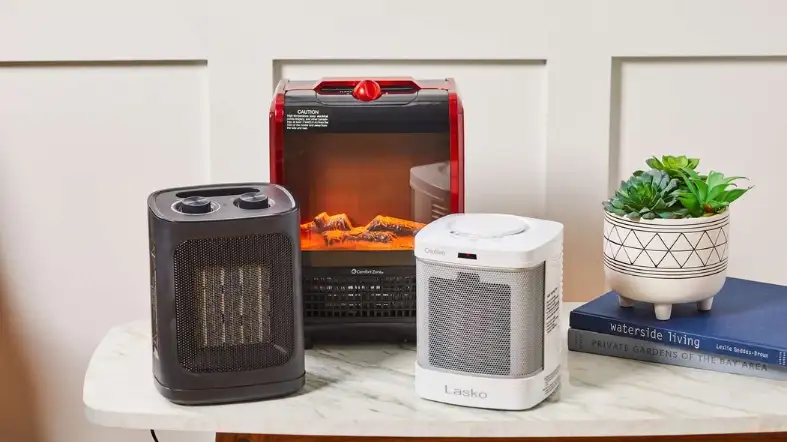Discover the truth behind that mysterious burning smell when you turn on your heater for the first time.
From dust accumulation to melted components, we’ll unravel the causes and solutions.
Dive into our comprehensive guide to understand why your heater emits that smoky odor and learn how to ensure a safe and comfortable winter season.

Why Do Heaters Emit a Burning Smell Upon First Use?
Heaters emit a burning smell upon first use due to dust settling on the heater’s components during periods of inactivity. When the heater is powered on, this accumulated dust is heated and emits a smoky odor. This is normal and usually harmless, as long as the smell goes away after a few minutes of use.
This is normal and usually harmless, as long as the smell goes away after a few minutes of use.
However, dust accumulation is not the only possible cause of the burning smell. There are other factors that might contribute to this issue, such as:
- Melted plastic or rubber components
- Burnt wires or electrical components
- Foreign objects inside the heater
- Old or degraded filters
Common Causes for the Burning Smell in Heaters
Let’s take a closer look at each of these causes and how they affect your heater.
Dust Accumulation
Reasons for accumulation: As mentioned earlier, dust and other particles can accumulate inside the heater over time, especially if the heater is stored in a dusty or humid place. Dust can also enter the heater through the air vents or gaps in the casing.
Effects on the heater: Dust can reduce the efficiency and performance of your heater by clogging the air flow and overheating the components.
It can also pose a fire hazard if it ignites due to high temperatures or sparks.
Melted Plastic or Rubber Components
Possible reasons for melting: Plastic or rubber parts in your heater might melt due to excessive heat, faulty wiring, or poor quality materials.
For example, some heaters have plastic knobs or handles that might melt if they come in contact with the heating elements.
Some heaters also have rubber gaskets or seals that might deteriorate over time and leak.
Impact on heater’s functionality: Melted plastic or rubber can damage your heater by causing short circuits, leaks, or blockages.
It can also release toxic fumes that are harmful to your health and the environment.
Burnt Wires or Electrical Components
Causes of electrical burnouts: Wires or electrical components in your heater might burn out due to power surges, voltage fluctuations, loose connections, or faulty parts.
For example, some heaters have thermostats or sensors that might malfunction and cause overheating or overloading of the circuits.
Signs and dangers: Burnt wires or electrical components can cause sparks, smoke, flames, or electric shocks.
They can also damage your heater beyond repair and pose a serious fire risk.
Foreign Objects Inside the Heater
How objects might get inside: Foreign objects such as insects, rodents, toys, paper clips, coins, or other small items might get inside your heater through the air vents, gaps in the casing, or openings in the cord.
These objects might be accidentally dropped, blown by wind, or carried by pests.
Risks associated: Foreign objects can interfere with the functioning of your heater by obstructing the air flow, damaging the components, or causing short circuits. They can also ignite and cause fires or explosions.
Old or Degraded Filters
Importance of filters: Filters are essential for maintaining the quality and safety of your heater.
They filter out dust, allergens, bacteria, and other contaminants from the air that passes through your heater.
They also protect your heater from dirt and debris that might damage it.
Impact of old filters on air quality: Old or degraded filters can lose their effectiveness and allow more pollutants to enter your heater and your indoor air.
This can affect your health and comfort by causing allergies, asthma, headaches, dry eyes, sore throat, or other respiratory problems.
It can also make your heater smell bad by trapping odors from smoke, pets, cooking, or other sources.
Immediate Steps to Take When Your Heater Smells Like Burning

If you notice a burning smell when you turn on your heater, you should take some immediate steps to ensure your safety and prevent further damage to your heater. Here are some things you should do:
- Turn off and unplug the heater. This will stop the heating process and prevent any potential fire hazards.
- Check for visible damage or foreign objects. Inspect your heater for any signs of melting, burning, sparking, or smoking. Also, look for any foreign objects that might be stuck inside or near your heater. If you find any, remove them carefully and dispose of them properly.
- Assess the filter’s condition. Examine your filter for any dirt, dust, or debris. If it is dirty or clogged, replace it with a new one. If it is damaged or missing, contact the manufacturer or a professional for a replacement.
- Avoid using the heater until the cause is determined. Do not turn on your heater again until you are sure that the burning smell is gone and that there is no risk of fire or injury. If you are unsure about the cause or the severity of the problem, consult a qualified technician for diagnosis and repair.
Factors That Might Amplify the Burning Smell in Heaters
Some factors might make the burning smell in your heater more noticeable or intense. These include:
Room Size and Ventilation
The size of the room and the amount of ventilation can affect how quickly and how much the burning smell spreads and dissipates.
A smaller or poorly ventilated room might trap the smell and make it linger longer. A larger or well-ventilated room might dilute the smell and make it fade faster.
Age of the Heater
The age of your heater can influence how prone it is to producing a burning smell.
A new heater might emit a burning smell when it is first used due to the manufacturing residues or oils that are burned off during the initial operation.
This is normal and should go away after a few hours of use. An old heater might emit a burning smell due to wear and tear, corrosion, or deterioration of its parts.
This might indicate a serious problem that requires immediate attention.
Frequency of Use
The frequency of use can affect how much dust and other particles accumulate inside your heater.
A heater that is used occasionally might have more dust buildup than a heater that is used regularly.
This might result in a stronger burning smell when it is turned on after a long period of disuse.
Maintenance Frequency
The frequency of maintenance can affect how clean and efficient your heater is.
A heater that is maintained regularly might have less dust and debris than a heater that is neglected or poorly maintained.
This might reduce the chances of producing a burning smell when it is turned on.
Heater Model and Manufacturer
The model and manufacturer of your heater can determine how well it is designed, constructed, and tested.
Some heaters might have better quality materials, components, and features than others.
Some heaters might also have more safety measures and certifications than others.
These factors might influence how likely your heater is to emit a burning smell and how severe it might be.
Environmental Conditions and Humidity
The environmental conditions and humidity can affect how your heater operates and how it reacts to dust and other particles.
A dry or cold environment might make your heater work harder and generate more heat than usual.
This might increase the possibility of burning off dust or other substances inside your heater.
A humid or warm environment might make your heater work less and generate less heat than usual.
This might decrease the likelihood of burning off dust or other substances inside your heater.
Previous Repairs and Alterations
The previous repairs and alterations that have been done to your heater can affect its performance and safety.
Some repairs or alterations might have been done properly and professionally, while others might have been done poorly or amateurishly.
Some repairs or alterations might have improved your heater’s functionality, while others might have compromised it.
These factors might affect how your heater produces heat and how it handles dust and other particles.
Heater’s Power Source: Electric vs. Gas
The power source of your heater can affect how it generates heat and how it emits odors.
An electric heater uses electricity to heat up metal coils or ceramic plates that radiate heat into the air.
An electric heater might produce a burning smell due to dust accumulation on the heating elements or electrical problems in the wiring or circuits.
A gas heater uses natural gas or propane to ignite a flame that heats up air or water that circulates through pipes or vents.
A gas heater might produce a burning smell due to gas leaks, incomplete combustion, or carbon monoxide poisoning.
Are there certain heater models known to produce this smell more than others?

There is no definitive answer to this question, as different heater models and manufacturers might have different quality standards, features, and safety measures.
However, some general factors that might affect how likely your heater is to produce a burning smell are:
The type of power source
Electric heaters tend to produce more burning smells than gas heaters due to dust accumulation on the heating elements or electrical problems in the wiring or circuits.
The age of the heater
New heaters tend to produce more burning smells than old heaters due to manufacturing residues or oils that are burned off during the initial operation.
The frequency of use and maintenance
Heaters that are used occasionally or poorly maintained tend to produce more burning smells than heaters that are used regularly or well maintained due to dust buildup or component deterioration.
FAQs About Burning Smells in Heaters
Why is the smell stronger when turning on the heater after prolonged disuse?
When the heater is turned on, these particles are burned off quickly and intensely, creating a stronger odor.
Does the burning smell indicate a significant risk or hazard?
However, if the smell persists, worsens, or is accompanied by smoke, flames, or electric shocks, then the burning smell might indicate a significant risk or hazard.
How often should I clean or service my heater to avoid this issue?
Can using aftermarket or non-standard parts in heaters cause a burning smell?
For example, using a wrong-sized filter, a low-quality thermostat, or a faulty sensor can affect your heater’s performance and safety and cause overheating, melting, or burning of the parts.
Final Words
In this illuminating article, we’ve uncovered the reasons behind the burning smell from your heater’s first use.
Whether it’s dust, melted components, or foreign objects, you now have the insights to diagnose and address the issue.
With our guide, you can keep your heater efficient, safe, and odor-free. Say goodbye to uncertainties and embrace a warm and worry-free winter ahead.
